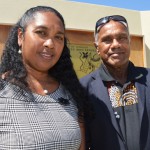
March 22, 2019
Housing costs, welfare payments and short-term funding cycles have been identified as key issues linked to intergenerational poverty in Australia.
A Federal House of Representatives’ Select Committee tabled its final report into intergenerational welfare dependence on Friday.
The inquiry focused on the complex causes and impacts of entrenched disadvantage, particularly on families and children.
Committee chairman Russell Broadbent (Liberal) said the inquiry had found there were many contributing factors.
Factors identified in submissions included the lack of predictable, secure, paid work; the shortage of affordable, flexible childcare; unfriendly work practices and conditions; experiences of violence; drug and alcohol use; education, social exclusion, transport and geography.
“People at greater risk of entering entrenched disadvantage include single-parent families, long-term unemployed people, people with disabilities and Indigenous Australians,” Mr Broadbent said.
The Select Committee, which was was appointed in May 2018, held several public hearings and invited submissions.
Its final report, “Living On The Edge”, includes 16 recommendations (see below).
* * *
The Select Committee recommended the Federal Government:
- Continue to prioritise funding for place-based and wrap-around services that can demonstrate evidence of successful programs for people living with entrenched disadvantage.
- Immediately work through COAG to implement the agreed COAG recommendation from 2009 that all educational data sets including school attendance records should be shared between all States and Territories.
- Work with State and Territory governments to ensure immediate increases in funding for emergency relief housing and ongoing low-cost housing throughout Australia.
- Continue to streamline data-sharing protocols and arrangements with States and Territories.
- Improve its co-ordination with State and local programs, to ensure expenditure achieves the best possible outcomes, and avoids duplication.
- Support programs that build local leadership capacity, and incorporate local input in identifying and implementing solutions to entrenched disadvantage.
- Adopt a set of principles similar to those suggested by “Logan Together” for addressing entrenched poverty, disadvantage and welfare dependency.
- Provide strategic leadership of welfare programs, based on national priorities and knowledge of best-practice approaches.
- Review the effects of government policy, including the adequacy of payments, on young people and single parent families in the 46th Parliament.
- Consider changing the point at which single parents move to Newstart Allowance, from when their youngest child turns eight to when their youngest child turns 12. This should be in conjunction with continued efforts to increase the participation of parents in the workforce.
- Encourage employers to investigate opportunities associated with social investment organisations; including encouraging employers to make operational changes that would facilitate opportunities for single parents to enter the workforce, such as part-time or job-sharing arrangements.
As well, it recommended that:
- Funding arrangements for welfare-related programs are reviewed, with a view to avoiding short-term funding cycles. Three to five-year agreements, with annual extensions subject to meeting agreed performance measures, would assist with funding certainty while ensuring progress and satisfactory outcomes are achieved.
- Funding agencies work with service providers to ensure accountability for expenditure of public funding in a way that allows programs to be flexible and responsive to local conditions.
- The continuation of comprehensive longitudinal data collection by State, Territory and Australian Governments, to enable informed decision-making on the Priority Investment Approach.
- Success of the Priority Investment Approach should be measured not just by reductions in welfare expenditure, but also by improved outcomes for welfare recipients.
- Funding agreements with social service providers should build in meaningful requirements for program evaluations or progress reports, and avoid imposing evaluation requirements that result in ‘proxy’ measures being reported to meet administrative timeframes.
“Logan Together”, mentioned in the recommendations, identified eight features of successful place-based, life-course models for addressing entrenched poverty, disadvantage and welfare dependency:
1. Take a long-term, whole-of-population approach at the place level.
2. Identify high-leverage change strategies across the health, education and social services sectors, and the community itself.
3. Embed these strategies in an inter-generational, life-course or “cradle to career” framework that focuses on key phases in human development from birth (indeed pregnancy) forward.
4. Create strategic co-ordination capability (a Backbone Team) and local level governance and collaboration arrangements (collective impact approaches) to deliver the strategies.
5. Include local people and local leaders in all aspects of planning and decision making.
6. Focus on capability building as well as service delivery.
7. Establish an authorising environment that allows local initiatives to be quickly supported and responded to by very senior stakeholders where required.
8. Co-ordinate investment and reform systems to support roll out.
- External link: The Final Report
























So in effect, the majority of issues addressed that the Liberals, Nationals, Conservative politic en masse bluntly oppose and or have opposing core values.
Regions have all the negative issues mentioned, if not the majority. But regions generationally have had pro-Conservative representation. The status quo needs changing.
The LNP’s Malthusian trap: the view that a “breakout” from the Malthusian trap will lead to an era of sustained income growth and wealth distribution allowing equality, rather then political ideology to shape this country’s future.
And Ross, your point is? And what are you really recommending? Really! Sounds like a load of “lefty lunacy” for sure.
These keyboard warriors never cease to amaze me. Quick to throw a political spin on things but I wonder if they want to be part of the solution? Actions speak louder that words. As members of our community we have a civic duty to roll up the sleeves and make a difference. Must be an election on the horizon?